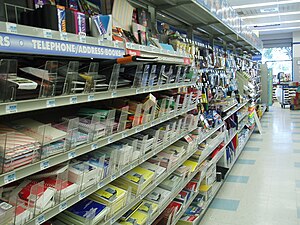
Back بوابة:الاقتصاد Arabic Portal:Ekonomija BS Portal:Economia Catalan دەروازە:ئابووری CKB Portál:Ekonomie Czech Portal:Wirtschaft German Πύλη:Οικονομία Greek Portal:Economía Spanish Portaal:Majandus Estonian درگاه:اقتصاد Persian
The Business and Economics Portal Business is the practice of making one's living or making money by producing or buying and selling products (such as goods and services). It is also "any activity or enterprise entered into for profit." A business entity is not necessarily separate from the owner and the creditors can hold the owner liable for debts the business has acquired. The taxation system for businesses is different from that of the corporates. A business structure does not allow for corporate tax rates. The proprietor is personally taxed on all income from the business. A distinction is made in law and public offices between the term business and a company such as a corporation or cooperative. Colloquially, the terms are used interchangeably. (Full article...) Economics (/ˌɛkəˈnɒmɪks, ˌiːkə-/) is a social science that studies the production, distribution, and consumption of goods and services. Economics focuses on the behaviour and interactions of economic agents and how economies work. Microeconomics analyses what's viewed as basic elements in the economy, including individual agents and markets, their interactions, and the outcomes of interactions. Individual agents may include, for example, households, firms, buyers, and sellers. Macroeconomics analyses the economy as a system where production, distribution, consumption, savings, and investment expenditure interact, and factors affecting it: factors of production, such as labour, capital, land, and enterprise, inflation, economic growth, and public policies that have impact on these elements. (Full article...) Selected articleTulip mania or tulipomania (Dutch names include: tulpenmanie, tulpomanie, tulpenwoede, tulpengekte and bollengekte) was a period in the Dutch Golden Age during which contract prices for bulbs of the recently introduced tulip reached extraordinarily high levels and then suddenly collapsed. At the peak of tulip mania, in March 1637, some single tulip bulbs sold for more than 10 times the annual income of a skilled craftsman. It is generally considered the first recorded speculative bubble (or economic bubble), although some researchers have noted that the Kipper- und Wipperzeit episode in 1619–22, a Europe-wide chain of debasement of the metal content of coins to fund warfare, featured mania-like similarities to a bubble. The term "tulip mania" is now often used metaphorically to refer to any large economic bubble (when asset prices deviate from intrinsic values). Selected image
Selected economyThe economy of New Zealand is a highly developed free-market economy. It is the 52nd-largest national economy in the world when measured by nominal gross domestic product (GDP) and the 62nd-largest in the world when measured by purchasing power parity (PPP). New Zealand has one of the most globalised economies and depends greatly on international trade, mainly with China, Australia, the European Union, the United States, and Japan. New Zealand's 1983 Closer Economic Relations agreement with Australia means that the economy aligns closely with that of Australia. New Zealand's diverse economy is made up of various types of informal and formal organisations, divided between two sectors, public and private. It has a sizeable service sector, accounting for 63% of all GDP activity . As a large island nation New Zealand has abundant natural resources and mineral wealth. Prominent manufacturing industries include aluminium production, food processing, metal fabrication, wood and paper products. Mining, manufacturing, electricity, gas, water, and waste services accounted for 16.5% of GDP . The primary sector continues to dominate New Zealand's exports, despite accounting for only 6.5% of GDP . The information technology sector is growing rapidly. (Full article...) Selected quote"All labour is directed towards producing some effect. For though some exertions are taken merely for their own sake, as when a game is played for amusement, they are not counted as labour. We may define labour as any exertion of mind or body undergone partly or wholly with a view to some good other than the pleasure derived directly from the work. And if we had to make a fresh start it would be best to regard all labour as productive except that which failed to promote the aim towards which it was directed, and so produced no utility. But in all the many changes which the meaning of the word "productive" has undergone, it has had special reference to stored-up wealth, to the comparative neglect and sometimes even to the exclusion of immediate and transitory enjoyment; and an almost unbroken tradition compels us to regard the central notion of the word as relating to the provision for the wants of the future rather than those of the present. It is true that all wholesome enjoyments, whether luxurious or not, are legitimate ends of action both public and private; and it is true that the enjoyment of luxuries affords an incentive to exertion, and promotes progress in many ways. But if the efficiency and energy of industry are the same, the true interest of a country is generally advanced by the subordination of the desire for transient luxuries to the attainment of those more solid and lasting resources which will assist industry in its future work, and will in various ways tend to make life larger. This general idea has been in solution, as it were, in all stages of economic theory; and has been precipitated by different writers into various hard and fast distinctions by which certain trades have been marked off as productive and certain others as unproductive." TopicsRelated WikiProjectsDid you know (auto-generated) -
On this day in business history
General imagesThe following are images from various business-related articles on Wikipedia.
More did you know
Business news Wikinews Economy and business portal
|
© MMXXIII Rich X Search. We shall prevail. All rights reserved. Rich X Search







































